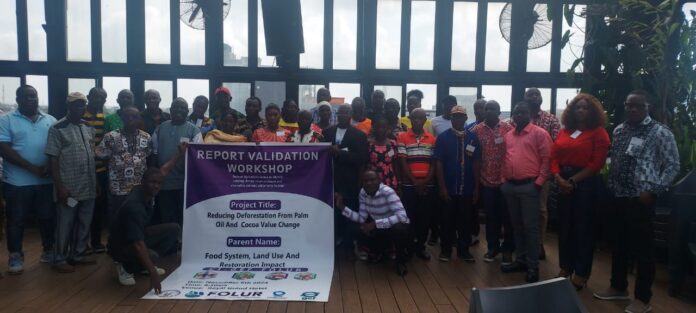The Society for the Conservation of Nature of Liberia (SCNL), along with its implementing partners and other stakeholders in the agriculture and forestry sectors, has validated a comprehensive report on the state of agriculture in Liberia.
The goal of this report is to promote climate-smart agricultural practices aimed at reducing deforestation and restoring degraded lands.
Developed by COMPRE Consulting, which was contracted by SCNL, this report is intended to support the government’s roadmap for climate-smart agriculture through agroforestry. Speaking during a day-long validation workshop in Monrovia, SCNL Program Director Michael E. Taire emphasized that the report will help stakeholders in the agriculture and forestry sector develop strategies that align with the government’s ARREST program.
“As we embark on this journey, it is essential to recognize the guiding principles of the government’s ARREST agenda, which emphasizes accountability, resilience, respect, equity, sustainability, and transparency,” Mr. Taire stated. “These principles are not just concepts; they are the foundation upon which we can build a more equitable agricultural sector that benefits all Liberians, particularly smallholder farmers, who are the backbone of our economy.”
Taire highlighted that the findings presented in the “State of Agriculture” report underscore the pressing challenges exacerbated by climate change and systemic inequalities. However, they also reveal significant opportunities for adopting climate-smart agriculture practices.
He noted that by integrating sustainable methods and innovative approaches, we can enhance productivity, improve livelihoods, and ensure food security for communities. “Today, we have the chance to validate our collective understanding of these issues and to align our strategies with the ARREST agenda for inclusive development, as well as the National Agriculture Development Plan (NADP) 2024-2030—a six-year policy designed to leverage technology and a cooperative approach to empower farmers and increase agricultural productivity,” Taire added.
The SCNL Program Director stressed the importance of listening to all stakeholders, especially those in the agriculture sector, including farmers and government representatives from the Ministry of Agriculture. He urged stakeholders to share experiences and collaborate on actionable solutions that address immediate challenges while paving the way for long-term sustainability and resilience in the agricultural sector.
This report is part of the Food System, Land Use, and Restoration Impact (FOLUR) project, being implemented by SCNL, Fauna and Flora International (F&F), and the Royal Society for the Protection of Birds (RSPB), with funding from the Global Environment Facility through Conservation International.
FOLUR Project Coordinator Madam Charlene Jallah Freeman explained the project’s importance in restoring degraded forest areas caused by farming and mining activities. She outlined four main components of the project; Development, adoption, and implementation of national and North-West Liberia landscape land-use plans.
The Promotion of sustainable production practices for food crops, palm oil, and cocoa, supported by responsible value chains,
Reduction of biodiversity loss and restoration of natural habitats and
Coordination, collaboration, and monitoring and evaluation.
Madam Freeman added that SCNL is directly involved in promoting sustainable production practices for food crops, palm oil, and cocoa in Gbarpolu, Cape Mount, and Lofa Counties. “We are working with cooperatives in these counties and have identified about six cooperatives that we are currently partnering with,” she shared.
“We also collaborate directly with local cocoa and palm oil farmers to enhance their production. This includes training on improved agricultural methods, recognizing that farmers are currently not earning sufficient profits. By adopting climate-smart agriculture practices, they can diversify their crops rather than relying on a single type,” she stated.
Madam Freeman highlighted that climate-smart agriculture practices offer numerous benefits. This approach informs farmers about the best planting seasons, advises on appropriate farming methods, pest management strategies, farm management techniques, and provides guidance on pre- and post-harvest activities.
“This report will help them understand these essential approaches,” she concluded, noting that climate-smart agriculture is a vital and innovative solution for achieving Liberia’s agricultural agenda.






















